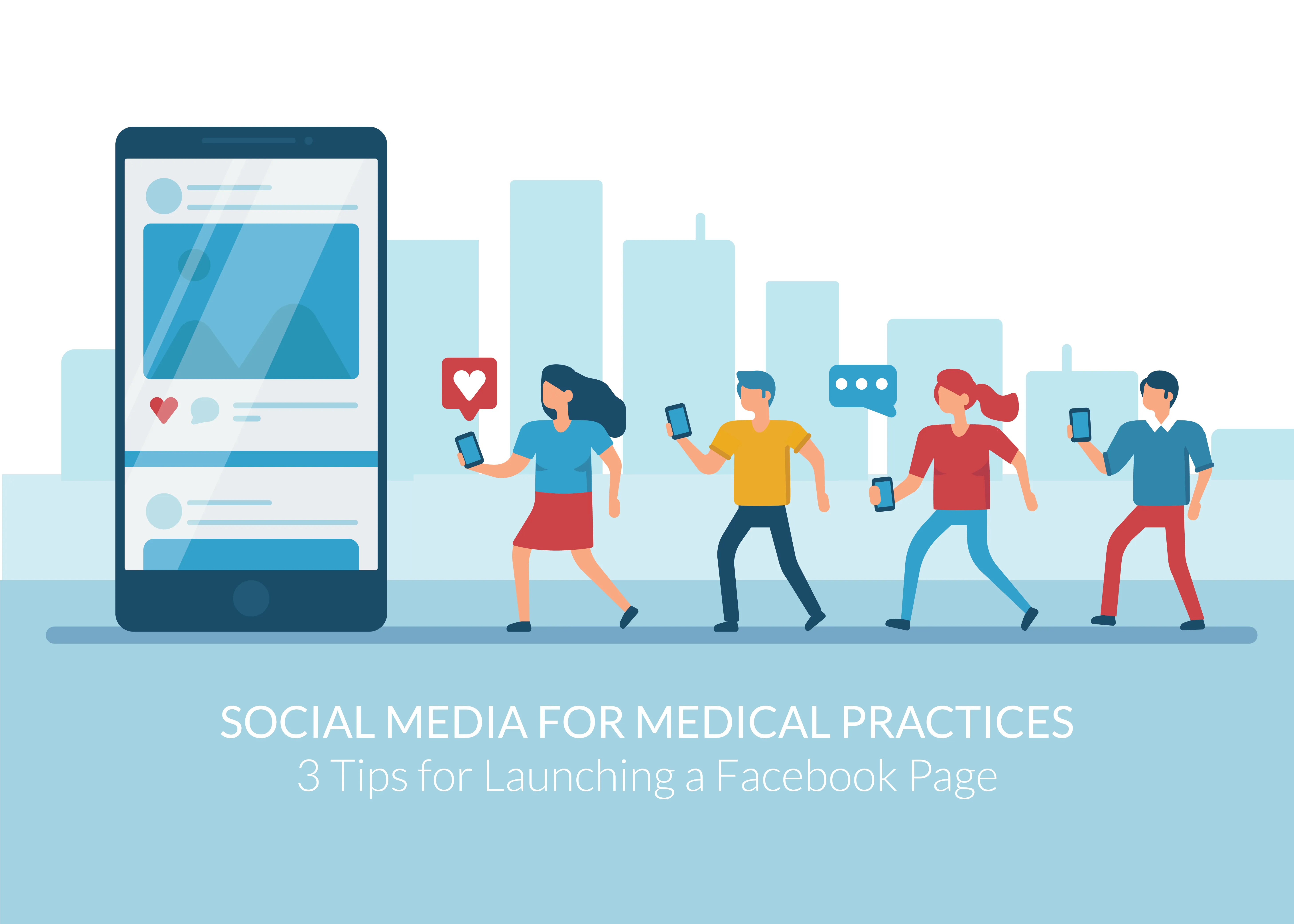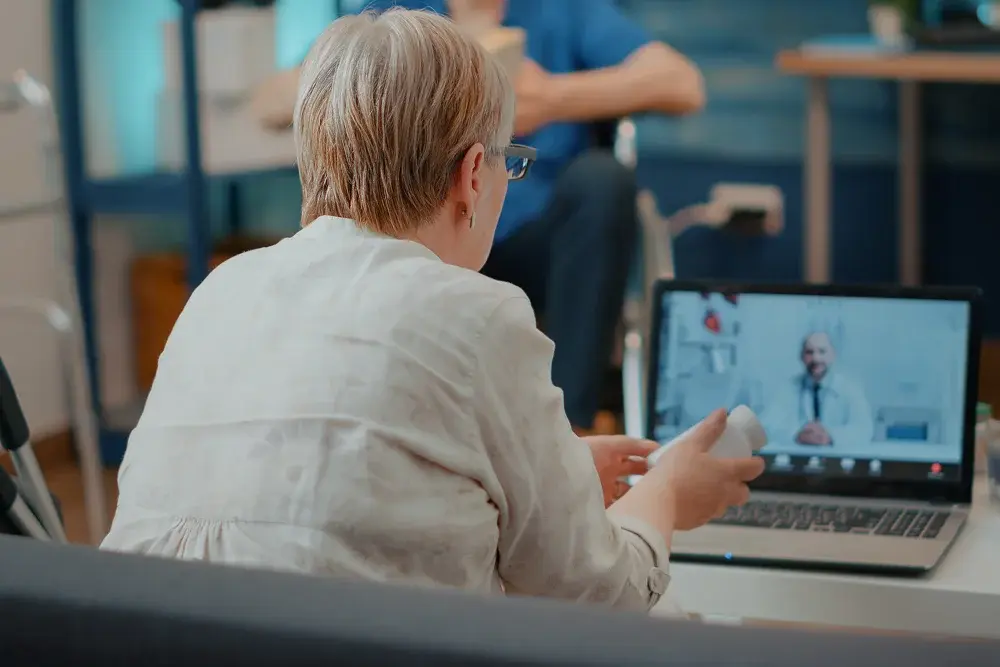Urgent care doesn’t have to mean long waits or crowded clinics. Telemedicine makes care faster, safer, and more accessible, helping providers and patients manage common concerns efficiently.
 Social media has become a prevalent part of the lives of consumers, and a vital tool for businesses to reach them. With more than 1.8 billion active users, it's no surprise Facebook is one of the biggest and most powerful social platforms out there.
Social media has become a prevalent part of the lives of consumers, and a vital tool for businesses to reach them. With more than 1.8 billion active users, it's no surprise Facebook is one of the biggest and most powerful social platforms out there.
Despite the growing popularity of Facebook and social media in general, these platforms have been slowly adopted by the healthcare industry. You may have some uncertainty about social media and its value within healthcare, but the reality is you can no longer afford to ignore it; social media has become the way of the world.
While jumping into social media may seem intimidating for your practice, it shouldn’t be. Facebook is a necessary channel for connecting with your existing patients and attracting new ones. Think of the platform as a way for you to interact better with patients, provide them a real look into what it’s like to be a patient at your practice as well as define your online reputation.
So what’s the next step for practices wanting to enter the Facebook world? Let’s review a few ways to achieve a great medical practice Facebook page—one that will benefit your practice and your patients.
1. Tell Patients Everything They Need to Know About Your Practice
Your patients are relying on social media to find information they need, such as recommendations about local businesses and even where to receive medical care. For many, Facebook has become a daily news source and resource for them to find answers about anything they want to know. According to FierceHealthcare in an interview with Kevin Pho, M.D., internal medicine physician and founder of KevinMd.com, 72 percent of people are looking online for health information. With so many people using Facebook to find information, medical practices can use this to their advantage.
When setting up your Facebook page make sure to make it easy for patients to find any information about your practice they may be looking for. Include a profile photo, such as your practice logo and a cover photo. Both images should be good quality photos that clearly represent your practice. Additionally, don’t shy away from the about section; be thorough about filling this section out so you give patients a good description of your practice. It’s equally as important to provide accurate practice details such as:
- Phone number
- Location
- Business hours
- Website
- Doctor's name(s)
- Specialty/conditions you treat
2. Share Helpful and Informative Content with Your Patients
Medical practices can also leverage Facebook to share information such as new research, health insights or other relevant information. Sharing information via social media is a great way to reach and educate patients while also building your online reputation.
During the flu season, for example, a doctor's office can share information about flu season statistics and posts to encourage preventive care. A simple post that reminds patients to get their flu shots, helps bring patients in while also promoting information that will help your patients and followers stay healthy throughout the flu season.
Keep in mind any content you share should be relevant to your patients as well as fall in line with the role you play as their healthcare provider. While you're content should also be consistent with your practice brand, you can have some fun with your posts by sharing a wide variety of content such as:
- Educational posts that share your expertise and advice
- Promotional posts that showcase your services
- Candid posts that personify your practice
- Practice-specific posts that give more info about your practice
Keep these additional best practices top of mind for maximizing engagement for the content you share:
- Keep the length of your posts within 40 characters.
- Always use an image to supplement your post.
- Incorporate video to tell your story (video content works well and is very shareable).
- Post often (at least 1x a day) and maintain a consistent schedule.
- Use hashtags when relevant.
3. Be Communicative and Interactive
Facebook promotes a new interaction between the practice and the patient. It’s never been easier to get your voice heard as a physician and connect with your patients. Though the internet isn’t the place for sharing private patient information, social media can be useful and convenient for general conversations.
For example, practices can use Facebook to communicate new office hours or holiday office hours so patients are aware of your updated schedule, without having to call in. Practices can decrease the amount of calls that come in and it’s more convenient for the patient. In some instances, this convenience could sway someone to choose one practice over another.
In addition, the Facebook reviews feature can give you insight into how your practice is doing from a patient’s point of view. Good reviews serve as additional credibility that will help promote your practice and give you insight into what you’re doing well. Bad reviews can help you pinpoint areas that need improvement. If you do receive a negative review, thank the person for their response and try to take the conversation offline as soon as possible to resolve the issue.
Facebook is a social platform, so it’s important to remember to be social with your followers. Be communicative and interactive. If you receive a comment, or someone likes something on your page, provide a thoughtful response. If you receive something that shouldn’t be addressed on Facebook, like requests for medical advice or patient-specific questions, follow the same two-step process mentioned above in the negative review example.
Closing Thoughts
The bottom line is social platforms, like Facebook give you an opportunity to increase visibility of your medical practice, keep in touch with your patients and build a following by sharing information. By following the earlier examples discussed above, you’ll surely be on your way to a successful, Facebook page for your medical practice.
Want more insights like this for your practice? Check out our free eBook: 5 Steps to Improving the Physician-Patient Relationship with Technology.
Topics: Insider, Small Practice, digital age
RECENT POSTS



TOPICS
- EHR Solution (193)
- EHR (127)
- digital age (120)
- Patient Care (117)
- Medical Billing (112)
- Specialty-Specific EHR (112)
- Industry Update (98)
- Technology in Healthcare (84)
- EHR Features (79)
- Small Practice (78)
- Medical billing services (74)
- Integrated EHR (64)
- RCM (64)
- HIPAA Security (62)
- Cloud-based EHR (44)
- New Technology (44)
- Telemedicine (44)
- Healthcare Office Management (40)
- Practice EHR News (38)
- Kiosk (31)
- Revenue Cycle Management (28)
- AI Solutions (25)
- ePrescribing (21)
- AI Scribing (17)
- Best EHR Software (17)
- Practice Management Software (13)
- AI-powered Medical Billing (12)
- EMR (12)
- TeleVisit (12)
- AI EHR (11)
- Practice Automation (11)
- AI Scribe (10)
- Client Favorites (10)
- The ONE (10)
- Switching to New EHR (9)
- Urgent Care (9)
- AI scanning (8)
- Best EHR Practice (8)
- EHR Integration (8)
- MACRA/MIPS (8)
- Patient Portal (8)
- Psychiatry EHR (8)
- Automated Health Tools (6)
- E-Prescribing (6)
- Medical Practice Management Software (6)
- Product Updates (6)
- events (6)
- MIPS (5)
- Mobile EHR (5)
- Telehealth Platforms (5)
- Family Medicine EHR (4)
- HIPAA (4)
- Insider (4)
- Integrated Practice Management (4)
- Internal Medicine EHR (4)
- MIPS Reporting (4)
- Multilingual AI Scribe (4)
- Orthopedics EHR (4)
- Podiatry (4)
- Podiatry EHR (4)
- Regulatory Updates (4)
- Telehealth Platform (4)
- Automated EHR (3)
- Chiropractic EHR (3)
- Digital Experiences (3)
- EHR Flaws (3)
- EHR Implementation (3)
- EHR for Chiropractors (3)
- EHR for Small Practices (3)
- Eligibility Verification in Medical Billing (3)
- Medical Coding Services (3)
- Patient Check-in Kiosk (3)
- PracticeEHR GO App (3)
- Cash Flow (2)
- Cashless Payments (2)
- Clearinghouse (2)
- Dermatology EHR (2)
- EHR Scheduling (2)
- Family Medicine (2)
- Foot and Ankle Care (2)
- Foot and Ankle EHR (2)
- Health records 101 (2)
- Healthcare Compliance Certification (2)
- Medical Billing Partner (2)
- Medical Credentialing (2)
- Pediatrics EHR (2)
- Quality of Patient Care (2)
- Reporting Under MIPS (2)
- Risk and Liability in Medical Settings (2)
- Voice-Activated AI Scribe (2)
- What Works Clearinghouse (2)
- ACA Subsidy (1)
- AI Scan (1)
- AI Scribe for Pediatric Care (1)
- Bariatric EHR (1)
- Behavioral Health Practices (1)
- Billing Communication (1)
- Billing for Private Practices (1)
- Cardiology EHR (1)
- Charting (1)
- Data Security (1)
- Dos and Don'ts (1)
- EHR Dashboard (1)
- EHR Guides (1)
- EHR KPIs (1)
- EHR Questions to Ask (1)
- EHR Transition (1)
- EHR for Chronic Illness (1)
- EMR vs EHR Difference (1)
- ENT EHR (1)
- Endocrinology EHR (1)
- Gastroenterology (1)
- Gastroenterology EHR (1)
- General Surgery EHR (1)
- Geriatric AI scribe (1)
- Geriatrics EHR (1)
- Guides (1)
- Healthcare Practice Office Management (1)
- Help Center Videos (1)
- Insurance Reimbursement (1)
- KPI (1)
- Key Performance Indicators (1)
- Lab Processing (1)
- MACRA (1)
- Nephrology EHR (1)
- Neurology EHR (1)
- Pain Management EHR (1)
- Patient Behavior (1)
- Pediatric Care (1)
- Physical Therapy EHR (1)
- Practice Cash Flow (1)
- Practice Efficiency (1)
- Pulmonology EHR (1)
- Reconsider Your EHR (1)
- Simplify Practice Management (1)
- Staffing in Healthcare (1)
- Switch Medical Billing Providers (1)
- Urgent Care Medical Billing (1)
- Urology EHR (1)
- insurance claim denials (1)









